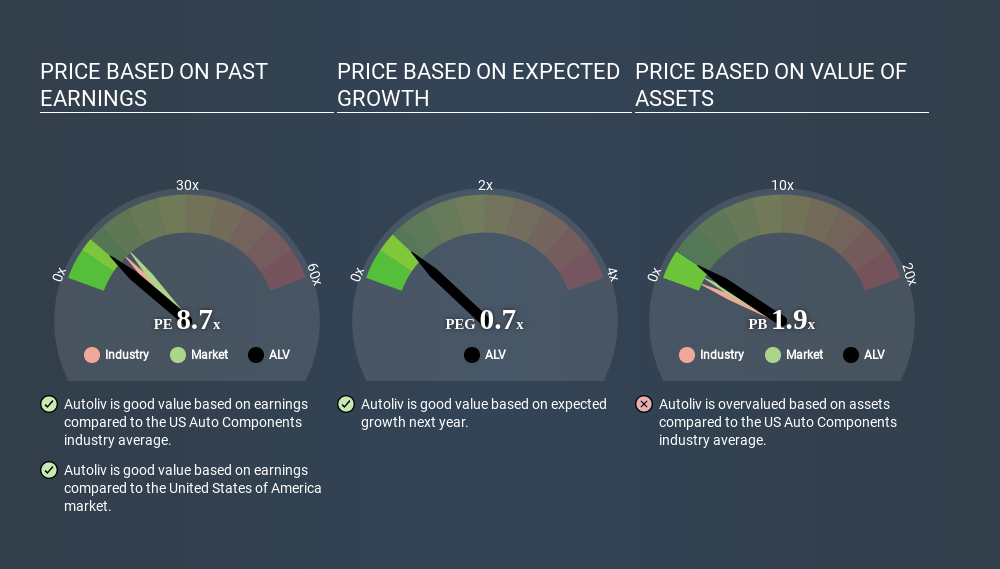- United States
- /
- Auto Components
- /
- NYSE:ALV
How Does Autoliv's (NYSE:ALV) P/E Compare To Its Industry, After The Share Price Drop?

Unfortunately for some shareholders, the Autoliv (NYSE:ALV) share price has dived 32% in the last thirty days. That drop has capped off a tough year for shareholders, with the share price down 42% in that time.
All else being equal, a share price drop should make a stock more attractive to potential investors. While the market sentiment towards a stock is very changeable, in the long run, the share price will tend to move in the same direction as earnings per share. The implication here is that long term investors have an opportunity when expectations of a company are too low. One way to gauge market expectations of a stock is to look at its Price to Earnings Ratio (PE Ratio). Investors have optimistic expectations of companies with higher P/E ratios, compared to companies with lower P/E ratios.
See our latest analysis for Autoliv
Does Autoliv Have A Relatively High Or Low P/E For Its Industry?
We can tell from its P/E ratio of 8.69 that sentiment around Autoliv isn't particularly high. The image below shows that Autoliv has a lower P/E than the average (11.4) P/E for companies in the auto components industry.

Autoliv's P/E tells us that market participants think it will not fare as well as its peers in the same industry. Since the market seems unimpressed with Autoliv, it's quite possible it could surprise on the upside. It is arguably worth checking if insiders are buying shares, because that might imply they believe the stock is undervalued.
How Growth Rates Impact P/E Ratios
Companies that shrink earnings per share quickly will rapidly decrease the 'E' in the equation. That means even if the current P/E is low, it will increase over time if the share price stays flat. Then, a higher P/E might scare off shareholders, pushing the share price down.
It's great to see that Autoliv grew EPS by 23% in the last year. In contrast, EPS has decreased by 5.8%, annually, over 3 years.
Remember: P/E Ratios Don't Consider The Balance Sheet
One drawback of using a P/E ratio is that it considers market capitalization, but not the balance sheet. That means it doesn't take debt or cash into account. Theoretically, a business can improve its earnings (and produce a lower P/E in the future) by investing in growth. That means taking on debt (or spending its cash).
Such spending might be good or bad, overall, but the key point here is that you need to look at debt to understand the P/E ratio in context.
Is Debt Impacting Autoliv's P/E?
Net debt is 41% of Autoliv's market cap. While that's enough to warrant consideration, it doesn't really concern us.
The Verdict On Autoliv's P/E Ratio
Autoliv's P/E is 8.7 which is below average (13.1) in the US market. The company does have a little debt, and EPS growth was good last year. If it continues to grow, then the current low P/E may prove to be unjustified. What can be absolutely certain is that the market has become more pessimistic about Autoliv over the last month, with the P/E ratio falling from 12.7 back then to 8.7 today. For those who prefer to invest with the flow of momentum, that might be a bad sign, but for deep value investors this stock might justify some research.
Investors have an opportunity when market expectations about a stock are wrong. If it is underestimating a company, investors can make money by buying and holding the shares until the market corrects itself. So this free visual report on analyst forecasts could hold the key to an excellent investment decision.
Of course, you might find a fantastic investment by looking at a few good candidates. So take a peek at this free list of companies with modest (or no) debt, trading on a P/E below 20.
If you spot an error that warrants correction, please contact the editor at editorial-team@simplywallst.com. This article by Simply Wall St is general in nature. It does not constitute a recommendation to buy or sell any stock, and does not take account of your objectives, or your financial situation. Simply Wall St has no position in the stocks mentioned.
We aim to bring you long-term focused research analysis driven by fundamental data. Note that our analysis may not factor in the latest price-sensitive company announcements or qualitative material. Thank you for reading.
About NYSE:ALV
Autoliv
Through its subsidiaries, develops, manufactures, and supplies passive safety systems to the automotive industry in Europe, the Americas, China, Japan, and rest of Asia.
Outstanding track record with adequate balance sheet and pays a dividend.
Similar Companies
Market Insights
Community Narratives



